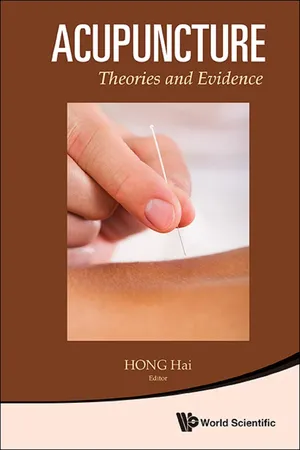
- 200 pages
- English
- ePUB (mobile friendly)
- Available on iOS & Android
About This Book
Acupuncture is widely practised in the 21st century in scientifically developed countries for a wide range of ailments ranging from chronic pain, giddiness and high blood pressure to gastrointestinal disorders and sexual dysfunction. Yet the reasons for its vaunted efficacy remain a matter of controversy. In traditional Chinese medical theory, the mechanism of action in acupuncture was understood in terms of the flow of qi and the balance of yin and yang through the body's meridians, a complex network painstaking charted but never found. Modern medical researchers have examined old and new needling points, and some view them as “trigger points” that stimulate physiological responses in the body. There is also clear evidence of strong placebo effects, although it has not been conclusively established that that this is either the main or the only significant effect.
This volume contains twelve articles covering the latest scientific explanations of the mechanism of acupuncture and critical reviews of clinical trials on its efficacy by leading scholars, including Edzard Ernst at Exeter, Lixing Lao at the University of Maryland, PC Leung at the Chinese University of Hong Kong and Thomas Lundeberg at Karolinska Institute.
Hong Hai is Senior Fellow at the Institute of Advanced Studies and Adjunct Professor, Nanyang Technological University, Singapore and Director of the Renhai Clinic.
Contents:
- Scientific Explanations for Acupuncture:
- Mechanisms of Acupuncture in Pain: A Physiological Perspective in a Clinical Context (Thomas Lundeberg)
- Explanatory Nature, Models, Needs and Requirements for Testing Them (Stephen Birch)
- The Ontological Status of Meridians (Hong Hai)
- Modern Scientific Explanation of Traditional Acupuncture Theory (Ching-Liang Hsieh)
- Cognitive Neuroscience, Acupuncture and Pain Treatment. Does a Sting Always Hurt? (K Theodoratou)
- Clinical Trials and Placebo Effects:
- Frequent Weaknesses in Acupuncture Trials (Edzard Ernst)
- The Complexities Inherent in Placebo-Controlled Acupuncture Studies (Lixing Lao, Lizhen Wang and Ruixin Zhang)
- Research Methodology in Acupuncture (Tat-Leang Lee and Zhen Zheng)
- The Use of Placebos in Acupuncture Trials (Dylan Evans)
- Improving the Quality of Randomized Controlled Trials (RCTs) in Acupuncture (Zhaoxiang Bian, Chungwah Cheng, Linda Chan, Mandy Cheung, Min Li and Zhixiu Lin)
- Acupuncture Treatment for Addiction (Ping-Chung Leung, Ellie S Y Pang, Lang Zhang and Eliza L Y Wong)
- Dense Cranial Electroacupuncture Stimulation for Neuropsychiatric Disorders: Rationale and Clinical Application (Zhang-Jin Zhang and Sui-Cheung Man)
Readership: Medical professionals, both Western medical doctors and TCM practitioners, acupuncturists, researchers and students. Also, libraries of TCM professional associations and teaching institutes.
Frequently asked questions
Information
Table of contents
- Cover
- Halftitle
- Title
- Copyright
- Contents
- Principal Contributors
- Foreword
- Introduction
- Part I Scientific Explanations for Acupuncture
- Chapter 1 Mechanisms of Acupuncture in Pain: A Physiological Perspective in a Clinical Context
- Chapter 2 Explanatory Nature, Models, Needs and Requirements for Testing Them
- Chapter 3 The Ontological Status of Meridians
- Chapter 4 Modern Scientific Explanation of Traditional Acupuncture Theory
- Chapter 5 Cognitive Neuroscience, Acupuncture, and Pain Treatment. Does a Sting Always Hurt?
- Part II Clinical Trials and Placebo Effects
- Chapter 6 Frequent Weaknesses in Acupuncture Trials
- Chapter 7 The Complexities Inherent in Placebo-Controlled Acupuncture Studies
- Chapter 8 Research Methodology in Acupuncture
- Chapter 9 The Use of Placebos in Acupuncture Trials
- Chapter 10 Improving the Quality of Randomized Controlled Trials (Rcts) in Acupuncture
- Chapter 11 Acupuncture Treatment for Addiction
- Chapter 12 Dense Cranial Electroacupuncture Stimulation for Neuropsychiatric Disorders: Rationale and Clinical Application